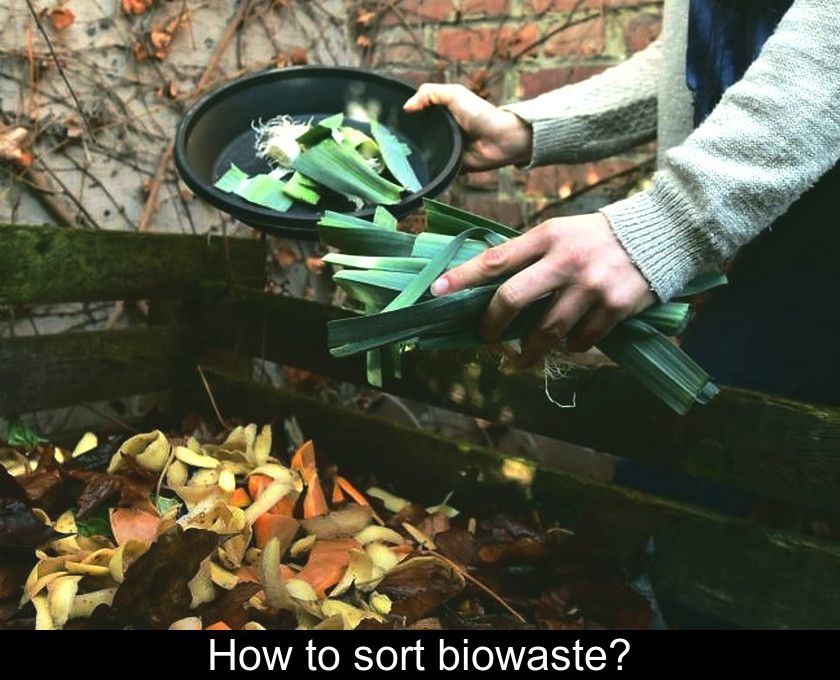How To Sort Biowaste?
From January 1st 2024, all French households will have to have a solution to sort their biodegradable waste. If you are wondering what is the sorting of biowaste at source, follow the guide! We explain you why and how to sort this organic waste.
What is biowaste?
If you've never heard the word, know that bio-waste refers to:
- kitchen and table waste
- leftovers from meals or their preparation
- uneaten expired products
- green waste from park and garden maintenance such as shrub and hedge trimmings, dead leaves or Lawn clippings...
All these organic wastes have in common that they are biodegradable, i.e. they can be naturally degraded by living micro-organisms.
Moreover, when we put them in landfills, these wastes ferment and risk emitting methane which is a powerful greenhouse gas.
But they do not only have disadvantages for the environment because they can also be recovered through land application, composting or methanization which allows to produce energy (biogas). This is why it is interesting to separate them from other waste and no longer bury or burn them.
Why sort bio-waste?
Currently, bio-waste is a major problem as it represents up to one third of unsorted waste by households in France.
But this situation will soon change: the law on the fight against waste of February 10, 2020 provides that all individuals will have to have a solution to perform the sorting of biowaste at source from January 1, 2024.
In practice, this means that local authorities will have to offer individuals ways to sort this waste at source. For example, they will have to provide their citizens with collection bins for individual or collective composting (at the level of a building, a street or a neighborhood).
Individuals will thus be able to separate their biodegradable waste from glass, packaging and the rest of the undifferentiated waste.
How to sort bio-waste at the source?
As of January 1, 2024, individuals will therefore be encouraged to sort bio-waste at the source.
You can prepare for this measure to go into effect by getting into the habit of no longer throwing your kitchen waste (such as peelings and eggshells) and meal scraps into the undifferentiated garbage can.
To sort these biodegradable wastes, you can get a home composter to place in your garden or balcony or other containers such as a bokashi kit or a worm composter to install in your kitchen.
Some communities encourage composting by distributing free composters. Ask your local city hall for more information.
To learn more about compostable waste, we invite you to read our articles on the subject opposite. You can also find a more detailed list of biowaste at the site below.
How is the collection of biowaste organized?
Even though the sorting of biowaste has become mandatory as of January 1, 2024, not all municipalities in France are operational at the moment. ADEME estimates that only 40% of the population benefits from a source separation solution for these wastes in 2024, representing 27 million inhabitants.
It is the mayors who set the terms for waste collection. Therefore, the responsibility to organize the sorting and recovery of biowaste falls on the municipalities and their groupings.
Each local authority is free to choose the organization that suits it best. The municipality can provide bins to residents and organize door-to-door collection or voluntary drop-off points. It can offer individual composters to those who wish or install neighborhood composters or those at the foot of buildings.
For individuals, there is no need to start sorting biowaste before the collection system is put in place in the municipality.
Can one be penalized for not sorting organic waste?
Contrary to what one might sometimes read, there is no fine of 35 euros if you do not sort your bio-waste in 2024. This rumor originated from Article R 632 of the Penal Code, which provides for a fine in case of non-compliance with regulations in place for the collection of all waste.
In reality, no one is going to rummage through your trash to check that you have sorted it properly. However, municipalities that delay in implementing mandatory sorting of bio-waste will pay more taxes because the general tax on polluting activities (TGAP) will increase in 2024. Therefore, local authorities have an interest in reducing the weight of their unsorted waste as soon as possible to pay less.






